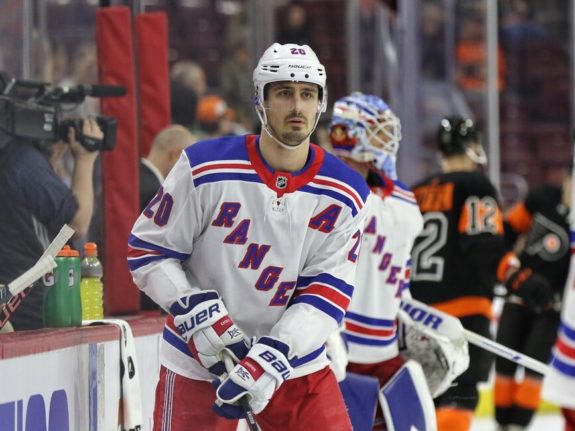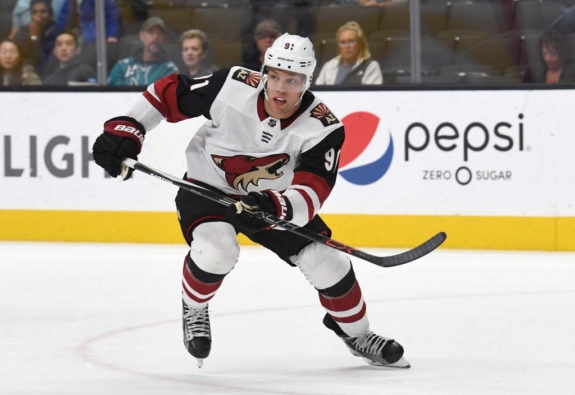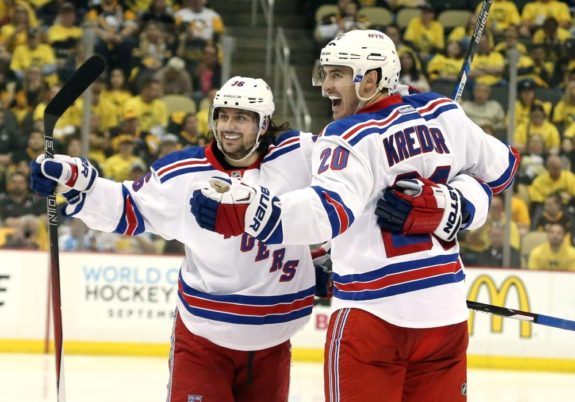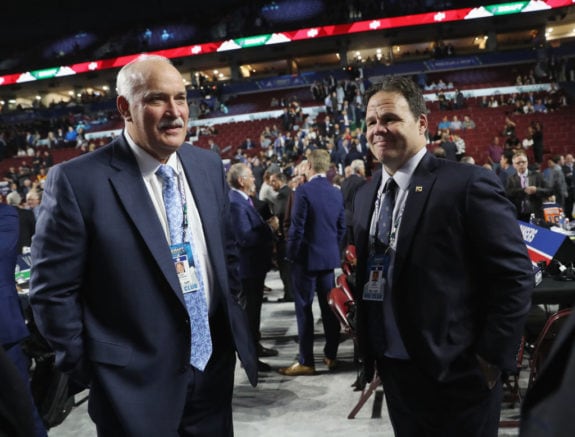The debate regarding Chris Kreider appears to have permanently shifted from whether the New York Rangers will try to extend his contract beyond this season, or if they’ll potentially trade him. The career Ranger is now a strong bet to be moved out, ending an eight-year run on Broadway and no doubt upsetting plenty of fans.
With Kreider set to receive a contract worth perhaps $7 million per season for a term that could run from five to seven years, it seems clear that the Blueshirts are ready to move on and reap the salary cap savings, unwilling to commit big bucks to a player that was good but never achieved the greatness many forecasted for him. The question now appears to be when to do a deal, and there are pros and cons that will come into play regardless of when he is moved.

The power-and-speed winger, who has 8 goals and 11 assists on the season but has scored only three times in the last 17 games, remains a major commodity on the trade market, and the Rangers will be trying to reap maximum value for Kreider. Timing, however, should play a big role in the process. The club needs to get this right, as it learned the hard way last season when it traded away other veterans at the deadline.
Option 1: Start Trying to Trade Kreider Immediately
The New Jersey Devils’ proactive decision to move Taylor Hall, the star forward who would have been the most sought-after player at the trade deadline in February, has set the market for forwards and cleared the way for the Rangers, who probably didn’t want to deal Kreider until Hall had been traded.
The Devils sent Hall to the Arizona Coyotes for three prospects and conditional first- and third-round draft picks Monday. While the Rangers won’t reap nearly the same amount of assets for Kreider, the large, well, “haul” for Hall could nonetheless help to lift the return for the Rangers’ No. 20 when the time comes.
The problem, though, is that demand simply isn’t going to be as high for Kreider or any other player at this point in the season. The Devils had their reasons for moving on and shipping out Hall now, and general manager Ray Shero has been criticized in some circles for not getting as much as he could for his rebuilding club.

One of those reasons may have had to do with Shero not wanting Hall’s impending departure to hang over the team all season – a concern that the Rangers should share. After all, it was just last season that they saw the effects late-season trades can have on a team.
On Feb. 24, the Rangers continued their rebuilding process by beginning a series of significant deadline trades for the second straight year, dealing fan-favorite Mats Zuccarello to the Dallas Stars. The next day, they sent center Kevin Hayes to the Winnipeg Jets and defenseman Adam McQuaid to the Columbus Blue Jackets, bringing back picks and one significant player in Brendan Lemieux.
The day before trading Zuccarello, the Rangers climbed to 27-26-8 with a 5-2 win over the Devils – a game in which Zuccarello, Hayes and McQuaid didn’t play. They proceeded to go 1-6-5 over their next 12 en route to crashing to a 5-11-5 finish. Aside from the talent drain, the message to the remaining players resonated: we’re packing it in this season with eyes on the future.
The departure of Zuccarello, a veteran leader and beloved teammate, was particularly hard on Henrik Lundqvist, Zuccarello’s friend and longtime fellow Ranger. The Blueshirts’ painful but necessary decisions had dealt a blow to the team’s psyche and rendered it largely uncompetitive for the rest of 2018-19.

That experience needs to be taken into consideration this season, with the Rangers reloaded with an offseason infusion of some of their young talent. While the playoffs may still prove to be a pipe dream for this group, management certainly doesn’t want a repeat of the last trade deadline experience, which played a major role in a disastrous end to the season that could be devastating to the confidence of its youthful roster in 2019-20.
Avoiding such a scenario just might be worth the deficit in talent that the Rangers would receive in return for trading Kreider now. Like Zuccarello, Kreider is a leader and is popular among his teammates – and, like Zucc, is someone who loves playing in New York.
There’s bound to be a depressing effect in the dressing room when he’s sent away.
Dealing with it earlier in the season, when there’s more time for players to recover and focus on the task ahead, could prove to be the best course of action for the present and future.
Option 2: Wait Until the Trade Deadline
The flip side of the coin: Kreider is a tradeable asset, and the Rangers are a rebuilding club. The responsibility of the front office should be to get maximum value for him, with this season’s results being secondary in consideration.
This approach should also merit serious consideration, given that the Rangers reportedly didn’t receive an offer for Kreider that they felt was commensurate with his value around the draft in June. The only way to build that value to where the club believes it should be might be waiting until when demand is the highest. That’s late February, at the deadline.
Potential trade partners can play coy in December and even January about their interest in a player like Kreider, as time remains on their side. With the deadline bearing down on them and a deep postseason run potentially hanging in the balance, however, contending clubs can’t afford that approach anymore. That creates bidding wars, which the Rangers would certainly like to see for the services of their 6-foot-3, 217-pound winger whose speed and power would be a tantalizing addition to anyone’s roster for the playoffs.

Kreider would fit right in with the speed-heavy operation known as the Colorado Avalanche, though the teams apparently couldn’t find a deal during the summer. The defending Stanley Cup champion St. Louis Blues are in first place in the Central Division, but star forward Vladimir Tarasenko underwent shoulder surgery in late October and was expected to miss five months. Kreider could serve as ideal insurance for Tarasenko, whose effectiveness this season will be in question even after he returns.
It’s worth pointing out the risks in waiting: Kreider could get injured before being moved, or allow his impending departure to affect his play, thus lowering his value. That’s what happened to Zuccarello last season, when he admitted that the likelihood of being dealt weighed heavily on him. A conversation with team management helped him clear his head, but the process profoundly affected him and the only NHL team he had known. Could the same happen to Kreider?
Verdict: Rangers Should Hold Kreider as Long as Possible
The Blueshirts likely didn’t want to go into this season with Kreider still on the roster and one year remaining on his contract, with the aforementioned potential for distraction being a major concern. The Rangers, though, remained disciplined during the offseason and didn’t make a trade just to make a trade, sticking to their desire to receive full value for the player.
That discipline should now extend into this season. The club will get the highest return for a player that’s scored 28 goals twice in the last three seasons at the trade deadline. Waiting until then is the right thing to do for the organization’s future, which remains the focus of the arduous process general manager Jeff Gorton and team brass put in place nearly two years ago.
A trade will likely prove painful for Kreider and his teammates. The possibility of a team-wide dip in performance that mirrors last season’s certainly exists. The Rangers, though, have waited this long to resolve this situation. To have done so only to act hastily now and not receive a maximum return for Kreider seems pointless.
If the Rangers handle this right, they’ll be facing a third consecutive trade deadline that witnesses the departure of more cornerstones of the recent past. Ryan McDonagh, J.T. Miller, Rick Nash and Zuccarello have bid farewell the last two years. It seems likely Kreider will be joining them this February, however agonizing that might prove to be in the short term.